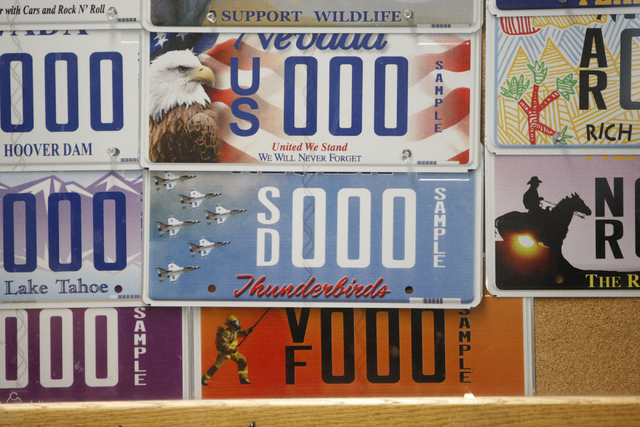Henderson, North Las Vegas plan to share license-plate data

Police in Henderson and North Las Vegas could soon begin sharing more than a million records of drivers’ whereabouts collected using automated license-plate readers.
It would be the first time either city has shared such data with an outside agency. But there are already privacy concerns about the huge databases the cities have amassed.
Henderson police have plate readers on nine patrol cars, while North Las Vegas has them on four cars.
Henderson keeps records of scanned plates for five years, regardless of whether there’s any link to a crime, city spokeswoman Kathleen Richards said. North Las Vegas doesn’t have a formal policy, but does not keep data for more than 10 years, said Officer Steven Wiese, a police spokesman.
The director of the American Civil Liberties Union of Nevada, Tod Story, said the practice of keeping the records for years raises serious privacy concerns.
“I think that’s just outrageous,” Story said. “There’s no justification for keeping anyone’s information for five years.”
Henderson has used the readers for more than four years, and North Las Vegas has had them for five years. Wiese said North Las Vegas police have more than 1 million stored records of license plate “reads.” Henderson did not respond to questions about how many it has.
Las Vegas police do not use the technology.
The systems use cameras to photograph license plate numbers on vehicles around a police car. The photos are then converted into text and compared against a “hot list” of tag numbers linked to stolen vehicles, wanted people, missing children, registered sex offenders or suspended registrations.
The cities’ computer systems store each plate number along with the date, time and GPS location where it was scanned.
The Henderson City Council is scheduled to vote Tuesday to approve a contract under which the city and North Las Vegas could share lists of scanned plates as well as hot lists. The North Las Vegas council has not scheduled a vote.
In the agreement, the two cities say the technology — and the new data sharing — will help them recover more stolen vehicles and catch more car thieves. They also say using automated readers is safer than having officers manually type plate numbers into car-mounted laptops.
Wiese said numbers were not available, but that North Las Vegas police have recovered “numerous” stolen vehicles thanks to automated plate readers.
Story said his concern is not with the technology itself. But keeping years’ worth of information on innocent drivers, he said, creates a database that can reveal intimate details about people’s lives: when and where they go to the doctor, for example.
“The problem is that you’re warehousing so much information on individuals,” Story said.
A 2013 national ACLU report on automated plate readers said there are too few rules in place to protect Americans’ privacy against the technology. That lack of rules and the widespread use of the technology by both governments and private companies have opened the door to abuses, the ACLU said.
Asked about privacy concerns, North Las Vegas’ Wiese said the system stores only a plate number and GPS coordinates, not any person’s name.
“Remember, these aren’t data records that we actively are searching through,” said Richards, the Henderson spokeswoman.
But it’s easy for police to search the databases for any tag number and find out where that car has been spotted.
“The larger question on a database like that is: Are law-abiding citizens comfortable with the police departments in Henderson and North Las Vegas having information on their whereabouts available to peruse or check at any time?” Story said. “I have to think the answer would be no.”
Contact Eric Hartley at ehartley@reviewjournal.com or 702-550-9229. Find him on Twitter: @ethartley












